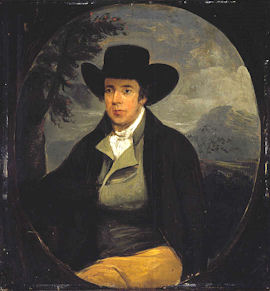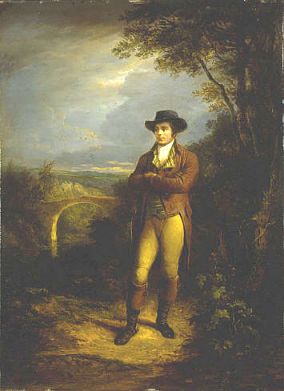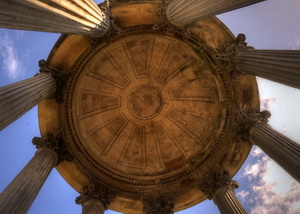The Balerno Burns Club, like countless other Burns Clubs throughout the world,
celebrates the life and legacy of Scotland’s National Bard, Robert Burns

Robert Burns by Peter Taylor c.1786
Ask any Burns enthusiast what the Bard’s life and works mean to them and you’ll receive one of countless answers. There are, however, a few aspects of his life that touch the hearts of most Burnsians, and which are beyond argument or contradiction.

His writings on life and times in 18th century Scotland recorded aspects of the day that might otherwise have been lost. His understanding of Humankind in that period raised him above other writers of his day and, indeed, above most who followed on.
“O wad some po’er the giftie gie us,
tae see oorsels as ithers see us
It wad frae mony a blunder free us
And foolish notion”
The ability of Burns to paint a picture with a few well chosen words was a talent the like of which was unknown in his day and, arguably, has never been matched since.
“But pleasures are like poppies spread:
You seize the flow’r, its bloom is shed;
Or like the snow falls in the river,
A moment white – then melts for ever;”
—

Robert Burns by Alexander Nasmyth c.1787
The manner in which he wrote of his family, friends and people whose paths he crossed has led to the memory of many others being immortalised too. His ability to understand all that was good about his fellow Man and, significantly, all that was bad inspired him to write lines as relevant to our lives in the early 21st century as they were when first penned.
“Then gently scan your brother Man,
Still gentler Sister Woman,
Tho they may gang a kennin wrang
To step aside is human.”
Burns left for posterity about 260 poems and more than 300 songs, many of which are known and appreciated all over the world, but less well known are his letters. His output was prodigious, – the product of an alert and lively mind, and although many of his letters have been lost, some 700 survive.
In Dumfries on 21st July 1896 the Centenary of the death of Robert Burns was commemorated in spectacular fashion. From many countries, specially appointed deputations brought memorial wreaths, tributes of reverence and affection. The streets of the Burgh were profusely decorated and a procession was organised which excelled anything ever seen in the Burgh, comprising over 3000 people, 21 bands and over 70 carriages, vans and lorries. It took almost an hour to pass. Lord Rosebery in his oration to an audience of over 4000 said, “Burns is not merely the watchword of a nation, that carries and implants Burns worship all over the globe, but has become the champion of Democracy. He bears the banner of the essential equality of man and he reigns over a greater dominion than any other empire the world has ever seen.”
The poems and songs of Robert Burns became popular in the United States of America almost as soon as they did in Scotland. Before 1800 three editions of his poetry had been published in America. Abraham Lincoln became acquainted with the poems of Burns in his early years in Indiana. When practicing law, before his election to Congress, he had a copy of Burns’s poems as an inseparable companion on the circuit and at the 100th Anniversary Burns Festival held at Springfield, Massachusetts, he gave a speech in which he spoke at length of Burns’s poems, illustrating what he said by many quotations. A clerk in Lincoln’s office said that Lincoln was a frequent reader and sincere admirer of Burns, both of his poetry and the familiar love and expression of the life and homely thoughts of common people.
As Russian author Evgenya Makarova has pointed out, the unmasking of social injustice is a constant theme in Burns’s poetry. He strives to show not only the cruelty, but also the stupidity of the existing order of things, to reveal and satirise the marks of internal weakness in what at a given moment may seem all-powerful and invincible.
At a Burns Supper in Edinburgh in 1992 the Japanese consul-general disclosed that Scotland’s national poet was making a contribution to traffic management in Tokyo. He explained that when the lights turned green at pedestrian crossings, those waiting on the pavement were jollied over the road to the strains of ‘Coming Through The Rye’.
The Chinese philosopher, Lin Yutang, wrote, ‘In order to understand China one needs a little detachment and a little simplicity of mind too; that simplicity of mind so well typified by Robert Burns, one of the most Scottish and yet most universal of all poets.’
The Russian poet, Mikhail Mikhailov, impressed by the romantic sentiments, lyricism and vitality of Burns’s poetry, translated a number of his poems. He recognised that Burns was a master craftsman in the art of wedding words to music, thus perpetuating the art of the bards of old.
An early French biographer, Auguste Angellier of the University of Lille, called Burns, ‘One of the most joyous, if not the most joyous of modern poets, the one with the frankest and the most abundant laughter.’
Ralph Waldo Emerson wrote of Burns, ‘No Latimer, nor Luther struck more telling blows against false theology than did this brave singer. The Confession of Augsburg, the Declaration of Independence, the French Rights of Man, and the Marseillaise, are not more weighty documents in the history of freedom than the songs of Burns.’
Ross Roy of the University of South Carolina wrote, “Across the centuries a living presence reaches out and touches our hearts with wonder that this simple man could find so much beauty in his harsh world.”
Duncan McNaught, editor of the Burns Chronicle in the late 19th century, wrote, ‘Burns is no abstraction to his countrymen. His poetry is embalmed in their hearts, and his overshadowing personality pervades and is ever associated with it.’
Throughout the life of Scotsman John Muir, who is revered in the USA as the father of world conservation, the poetry of Robert Burns was a source of enjoyment and inspiration. On lonely walks he had sung the songs; he had enjoyed reciting the poems with friends; he quoted the poet repeatedly in his writing. An essay he wrote on 25 January 1906 gives an indication of his regard for the poet. “As far as I know, none in all the world so clearly recognized the loving fatherhood of God as our ain Robert Burns, and there has been none in whose heart there flowed so quick and kind and universal a sympathy. On my lonely walks I have often thought how fine it would be to have the company of Burns. And indeed he was always with me, for I had him in my heart. So real was his companionship, he oftentimes seemed to be with me in the flesh, however wild and strange the places where I wandered. Wherever a Scotsman goes, there goes Burns. The man who has done most to warm human hearts and bring to light the kinship of the world, is Burns, Robert Burns, the Scotsman.”
The Legacy of Robert Burns will forever shine on the International stage. He wrote “Auld Lang Syne” which is the one and only International Anthem. Listen to the news reports on New Year’s Day about midnight celebrations in major cities around the world and there it is, being sung by hundreds of thousands on a geographical scale too vast for even Burns’ astute mind to imagine.

Inside Burns’ Monument, Alloway
(Photo courtesy of Les Hoggan Landscape Photography)
In an age cursed by warring factions throughout the world, and with domestic problems in most countries, it would be nice to think that someone in authority somewhere, might remember Burns’ most famous lines of all :
“For a that and a that,
It’s comin yet for a’ that,
That Man to Man the World o’er,
Shall brithers be for a’ that.”
Robert Burns died at the young age of 37 on 25th July 1796. Together with his own writings, his work in gathering and preserving traditional songs and verse from earlier years has left us with an amazing legacy; a legacy which, some 250 later, we all do our bit to further preserve every time we read, recite or sing his words.
Greatest Scot
In 2009, “STV” ran a television series and public vote on who was “The Greatest Scot”. On St Andrew’s Day that year, they announced that Robert Burns had won their election, being voted the Greatest Scot of all time, narrowly beating William Wallace into second place.
Thanks to ‘Let it Blaw’ Past President Ken McDonald for his contribution to this page.
